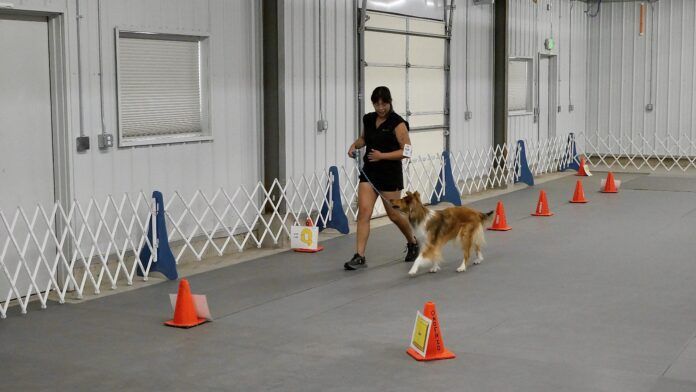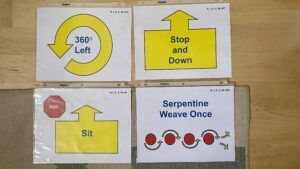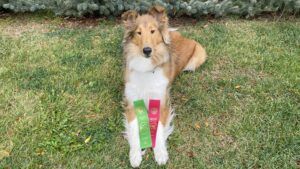
I’ve been teaching my Rough Collie, Dashi, tricks and obedience skills since she came home at 10 weeks old. She began learning agility foundations as a puppy, but true jumping and contact work shouldn’t be practiced with young dogs. While I waited for her to grow up a bit to compete in agility, I began training—and once she was old enough—trialing with her in AKC Rally.
Rally is an easy entry point into the world of obedience-based dog sports. Unlike traditional obedience, handlers can speak to their dogs even when not giving a cue and encourage them while competing. It’s an excellent sport for building your relationship with your dog and fostering teamwork, and many of the skills can be taught at home.
What is Rally for Dogs?

In Rally obedience, dog and handler teams navigate a course made up of 10 to 20 different signs, where each sign asks for a different skill to be performed. The signs range from basic exercises like sits and downs in the Novice level, to more complicated positioning and turns in the higher levels. There are 42 different signs in the Novice level of AKC Rally, and more signs are added on top of those 42 as you move up each level. By the time you reach the Master class, there are over 100 total signs that the course could contain.
In trials, teams are scored out of 100, where mistakes can cost you anywhere from one to 10 points off your total score. If you achieve a passing score (anything 70 points and above), you’ll receive a qualifying leg towards a title. There are a number of titling levels of AKC Rally: Novice, Intermediate (optional), Advanced, Excellent, Advanced Excellent, Master/Choice, and Rally Champion. These level names differ for different kennel clubs, like the United Kennel Club (UKC).
How to Get Your Dog Started in Rally
If your dog has baseline obedience skills like heeling and sitting and you’re comfortable training on your own, the AKC has images and videos of all levels of Rally signs that you can teach at home. Just watch the videos on the AKC Obedience and Rally YouTube channel and aim to replicate them at home. The foundational skills for the Rally Novice level are heeling with turns, sit, down, and front.
If you don’t want to teach the 42 Rally Novice signs on your own, or if your dog needs to learn a structured heel, look for a local Rally class to take. Many dog training clubs and private trainers offer Rally classes, and local all-breed kennel clubs may also offer drop-in classes where you can come learn with your dog. As a Rally instructor myself, I recommend taking at least a few classes with a trainer—especially if you haven’t practiced free shaping, luring, and clicker training before. Understanding these skills first makes it much easier to train your dog how to complete the signs.
Once you and your dog have learned the Rally Novice signs, look for Rally mock-trials or fun matches! Often held in conjunction with conformation fun matches, Rally matches can be a good way to practice Rally skills with your dog in a distracting, trial-like environment. The benefit of a fun match though, is that there’s no pressure to avoid mistakes, and you can often practice the laid-out course a few times while you’re in the ring.
How to Find and Enter Rally Events
To be eligible to enter AKC Rally trials, dogs need to be six months or older and have an AKC registration or PAL listing number. Deaf dogs can participate, but blind dogs and females in season can’t.
If you feel ready to compete, the best way to find Rally trials is through AKC’s Event Search Tool. Just open the page, select “Companion Events,” then “Rally.” You can then filter the results by state, date range, and more. Once you hit “retrieve events,” you’ll get a number of results that match your selected criteria. Click on the link to the Premium page for more details like the venue address, the price of entries, and you’ll find instructions for how to enter the event. Though they can be held as stand-alone events,
Rally trials are typically held in conjunction with all breed and specialty dog shows, which means you’ll have to find the superintendent of the larger show in order to enter Rally. The superintendent will be listed in the premium, and you’ll then need to search for the event on the super’s website and follow the online instructions to enter.
Most Rally trials allow online entry and payment, but mail-in entries and payment may also be available. Note that AKC rally trials close for entry two weeks before the event, and same-day entries are not normally allowed.
If you’re looking for an event, are having trouble locating a class near you, have questions about Rally, or just need some help with specific skills, joining a Facebook group dedicated to Rally may also help you find the information you’re looking for.
UKC also offers rally events, though there are differences in signs, ring procedure rules, and scoring. UKC Rally Obedience events can be found through the kennel club’s All-Breed Sports Calendar tool.
How to Earn Rally Titles

Once you start competing, it’s easy to get hooked on completing titles. When a dog completes a title, not only do they get a fancy new ribbon—they also get title letters added to the end of their official, or registered name. Here are the AKC Rally titles, title abbreviations, requirements, and details.
Novice (RN): Teams need three qualifying runs scored 70 or higher from two different judges. This level is performed on-leash and courses are made up of 10-15 different signs.
Intermediate (RI): Intermediate is an optional class, so teams can choose to skip it and go straight to Advanced if they wish. Intermediate courses contain between 12 and 17 signs. This class is performed on leash and requires three 70+ scored runs from two different judges to earn the title.
Advanced (RA): Advanced is the first class performed off leash, and courses are made of 12-17 signs. Dogs need to have already completed the RN title and earn three qualifying scores of 70 or higher from a total of two judges.
Excellent (RE): Excellent is also performed off leash, and courses can contain between 15 and 20 different signs. Dogs must have the Advanced title, plus three qualifying runs scored 70 or higher from two different judges.
Rally Advanced Excellent (RAE): Advanced Excellent departs from the titling status quo, since dog and handler teams are required to qualify in both Advanced and Excellent in the same trial 10 separate times.
Master (RM): Master is performed off leash, and dogs must already have the RE title to begin working towards the RM. Teams will need to complete 10 qualifying runs of 70 or higher under two different judges to earn the RM title.
Rally Choice (CRC): Choice is an optional, off leash class at the Master level, but doesn’t require any signs that contain jumps. Teams who earn the typical three qualifying runs of 70 or higher can claim the title.
Rally Champion (RACH): A Rally championship is the most difficult and time-intensive Rally title. To earn one, dogs first need to have their Rally Master title. Next, dogs need 20 triple Q’s, which means they must qualify in Advanced, Excellent, and Master in the same trial, 20 separate times. Dogs also need to accumulate 300 RACH points from the Advanced, Excellent, and Master classes, with at least 150 of those points from the Master class. Points are earned from runs scored 91 points and up, where a perfect 100 will get you 10 RACH points.
Should I Try Rally with My Dog?
If you’re interested in learning basic obedience skills and trying out a new sport with your dog, Rally is a great option. Not only will you and your dog learn loose leash walking, position work, sit and down stays, and other obedience commands, but you’ll also strengthen your relationship. Even if you don’t want to compete, just trying out a Rally class can boost your dog’s confidence and help you and your pup work together as a team.


